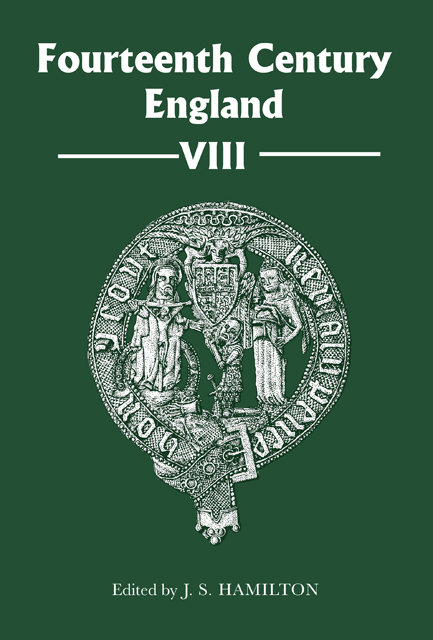Book contents
- Frontmatter
- Contents
- Contributors
- Preface
- Abbreviations
- King's Armourers and the Growth of the Armourer's Craft in Early Fourteenth-Century London
- In the Best Interest of the Queen: Isabella of France, Edward II and the Image of a Functional Relationship
- The First Entry of the Bishop: Episcopal Adventus in Fourteenth-Century England
- Temporalities Be Taken: Edward III, Unruly Ecclesiastics and the Fight for the Benefices of Exeter, 1337–60
- The Armour of Sir Robert Salle: An Indication of Social Status?
- Richard II, the Mortimer Inheritance and the March of Wales, 1381–84
- War, Chivalry and Regional Society: East Anglia's Warrior Gentry before the Court of Chivalry
- A ‘Sterre of þe See to ȝyue Lyȝt to Men’ and ‘Myrroure to Alle Sinful’: A Comparative Analysis of Biblical Women in the English Wycliffite Sermons with John Mirk’s Festial
- Index
- Fourteenth Century England issn 1471–3020
The First Entry of the Bishop: Episcopal Adventus in Fourteenth-Century England
Published online by Cambridge University Press: 15 February 2023
- Frontmatter
- Contents
- Contributors
- Preface
- Abbreviations
- King's Armourers and the Growth of the Armourer's Craft in Early Fourteenth-Century London
- In the Best Interest of the Queen: Isabella of France, Edward II and the Image of a Functional Relationship
- The First Entry of the Bishop: Episcopal Adventus in Fourteenth-Century England
- Temporalities Be Taken: Edward III, Unruly Ecclesiastics and the Fight for the Benefices of Exeter, 1337–60
- The Armour of Sir Robert Salle: An Indication of Social Status?
- Richard II, the Mortimer Inheritance and the March of Wales, 1381–84
- War, Chivalry and Regional Society: East Anglia's Warrior Gentry before the Court of Chivalry
- A ‘Sterre of þe See to ȝyue Lyȝt to Men’ and ‘Myrroure to Alle Sinful’: A Comparative Analysis of Biblical Women in the English Wycliffite Sermons with John Mirk’s Festial
- Index
- Fourteenth Century England issn 1471–3020
Summary
In August 1310, Walter Reynolds wrote a short letter to John de Wyke, prior of Worcester. Reynolds had recently been appointed chancellor of England, but his letter did not relate to royal business; rather, he was writing in his capacity as bishop of Worcester. His enthronement as bishop, he wrote, had been long delayed, and he was now anxious to remedy this; within a fortnight, he wrote again, this time to fix the date for his installation. The ceremony, which finally took place in late September 1310, was essentially a ritual in three stages: the first was the bishop’s entry into his cathedral city, the second the service of enthronement in the cathedral church, and the third the celebrations which followed. Together these rituals formed the final stage of the bishop-making process, the culmination of months or even years of discussions, disputes and ceremonies, and the only stage of this process not to be tightly controlled by the demands of canon law. This paper will explore the nature and significance of these ceremonies, as they were conducted and understood in England during the long fourteenth century.
The preparations for the enthronement of a new bishop were set in train when he despatched a letter to the dean or prior of his cathedral, in which he announced his intention to be enthroned. The bishop and the cathedral chapter first had to agree when the ceremony would take place; usually, but not always, the service would be held on a Sunday. Whilst its obvious religious significance made Sunday a fitting day for the installation of a bishop, more pragmatic concerns were also taken into consideration. In the 1430s, Prior Wessington encouraged Robert Neville of Durham to be enthroned at Christmas, pointing out that he would save money by combining his enthronement with the major feast of the year. It is probably no coincidence that at least eight fourteenth-century bishops made their first entry on one of the great Marian feasts,5 whilst three others were enthroned during Holy Week. Attendance was also an issue: the schedules of important guests were taken into consideration, and one of the benefits of Sundays and religious festivals must surely have been that if the masses were not at work, there was no good reason why they should not come to welcome their new bishop.
- Type
- Chapter
- Information
- Fourteenth Century England VIII , pp. 43 - 58Publisher: Boydell & BrewerPrint publication year: 2014



